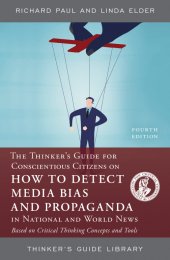The Thinker's Guide for Conscientious Citizens on How to Detect Media Bias and Propaganda in National and World News
Fourth Edition
Richard Paul and Linda Elder
Today’s instantaneous and ever-present news stream frequently presents a sensationalized or otherwise distorted view of the world, demanding constant critical engagement on the part of everyday citizens.
Designed to help readers recognize bias in the news; detect ideology, slant, and spin at work; and recognize propaganda when exposed to it, this critical thinking guide empowers readers to make sense of overwhelming and often subjective media. Richard Paul and Linda Elder focus on the internal logic of the news as well as societal influences on the media, while illustrating essential elements of trustworthy journalism.
As part of the Thinker’s Guide Library, this book advances the mission of the Foundation for Critical Thinking to promote fairminded critical societies through cultivating essential intellectual abilities and virtues across every field of study across world.
Rowman & Littlefield Publishers / The Foundation for Critical Thinking
Pages: 48 • Trim: 6 x 8
978-0-944583-20-3 • Paperback • January 2008 • $21.99 • (£14.95)
978-1-5381-3389-7 • eBook • June 2019 • $20.50 • (£13.95)
Series:
Thinker's Guide Library
$21.99
Additional Information About:
The Thinker's Guide for Conscientious Citizens on How to Detect Media Bias and Propaganda in National and World News
The logic behind bias and propaganda in the news media is simple and it is the same the world over. Each society and culture have a unique world view. This colors what they see and how they see it. News media in the cultures of the world reflect the world view of the culture for which they write. But the truth of what is happening in the world is much more complicated than what appears to be true in any culture. To be a critical reader of the news media in any society, one must come to terms with this truth and read accordingly. Critical thinking is a complex set of skills that reverses what is natural and instinctive in human thought.
Our goal in this publication is to help our readers lay a foundation for transforming the influence of the media on their lives. It is in all of our interests to critically assess, rather than mindlessly accept, news media pronouncements. Our hope is that we can aid readers to become more independent, insightful, and critical in responding to the content of news media messages and stories.
There are (typically) multiple points of view from which any set of events can be viewed and interpreted. Openness to a range of insights from multiple points of view and a willingness to question one’s own point of view is crucial to “objectivity.” Objectivity is achieved to the extent that one has studied a wide range of perspectives relevant to an issue, obtained insights from all of them, seen weaknesses and partiality in each, and integrated what one has learned into a more comprehensive, many-sided whole.
Learning to detect media bias and propaganda in the national and world news is an art that takes an extended time to develop. Yet it is also an art essential to intellectual responsibility, integrity, and freedom. This mini-guide presents a starting place for the development of intellectual analysis and assessment applied to news stories. As one develops in this art, one experiences a progressive shedding of layers of social indoctrination and ethnocentricity.
Contents include:
- Democracy and the News Media
- Myths that Obscure the Logic of the News Media
- Bias and Objectivity in the News Media
- The Perception of Bias in the Mainstream
- Propaganda and News Story Writing
- Protecting the Home Audience from Guilt Feelings
- The Mass Media Foster Sociocentric Thinking
- Journalists Slant Stories to Favor Privileged Views
- How to Obtain Useful Information from Propaganda and Standard News Stories
- Steps in Becoming a Critical Consumer of the “News”
- The Bias Toward “Novelty” and “Sensationalism”
- Is it Possible for the News Media to Reform?
- Is the Emergence of a “Critical Society” Possible?
- Dominant and Dissenting Views: Finding Alternative Sources of Information
- Using the Internet
